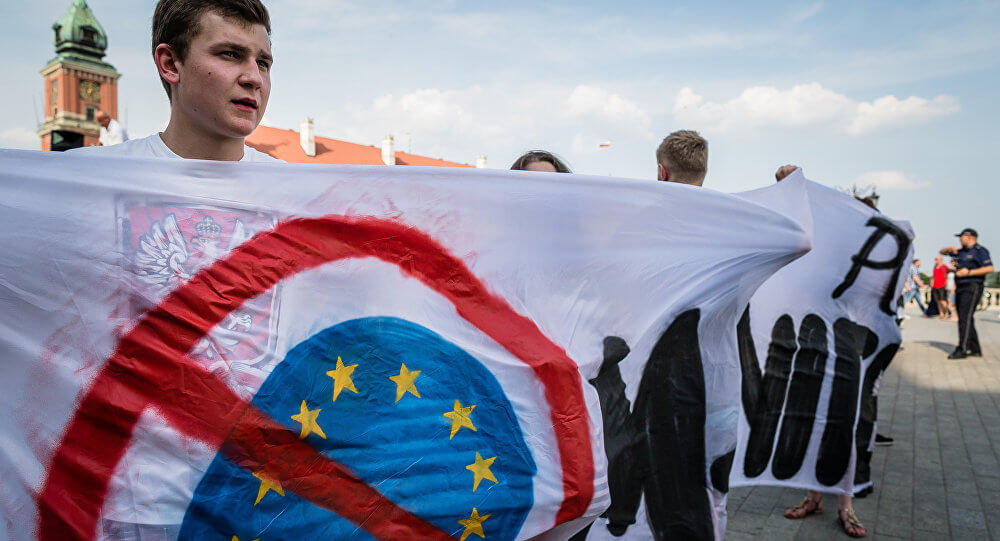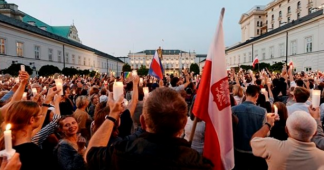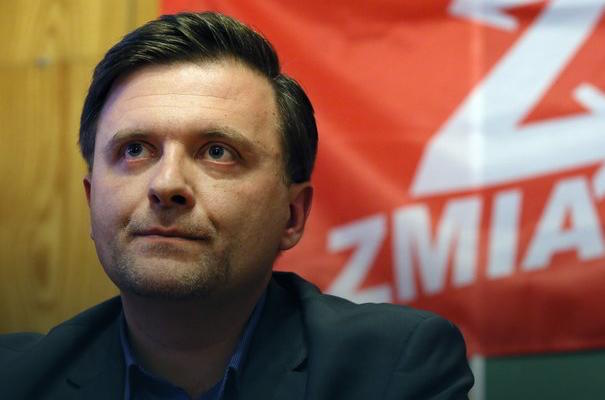By Clara Weiss
22 August 2017
The Polish government of the Law and Justice party (PiS) announced earlier this month that it would demand reparations from Germany for the massive damage done to the country under the Nazi occupation in World War II. Just a few days earlier, the European Union had initiated legal proceedings against Poland which could result in the country losing its voting rights in the EU. The developing conflict is symptomatic of the renewed eruption of national conflicts in Europe, which led to two world wars in the 20th century.
During World War II, some six million Poles (about 20 percent of the population) lost their lives under Nazi occupation, including over three million Polish Jews. Over 200,000 Polish civilians were killed just during the destruction of Warsaw in the summer of 1944 by the German Wehrmacht. Millions of Polish workers were employed as forced laborers in the German war economy.
Polish vice prime minister Mateusz Morawiecki has stated tht it was “clear” that the “historical accounts” had “not been settled. Our neighbors, especially the Germans, massacred Poland. I am not just talking about the six million Polish lives that were taken. Not even one percent of this was compensated.”
For decades, Berlin has been rejecting demands for reparations from Poland as well as from numerous other European countries. The German government’s vice press secretary Ulrike Demmer declared that the question of reparations to Poland had been settled, both legally and politically. Last year, former foreign minister Frank-Walter Steinmeier had similarly stated that any kind of reparation payments to Poland were out of the question.
In rejecting any demands for reparations, the German government is basing itself on contracts from 1953 and, particularly, the so called “Treaty of Good Neighborship” between Poland and Germany from 1991. The payments which occurred based on this agreement are absurdly low. Germany paid only 750 million Deutsche Marks (about 375 million Euros) directly as reparations, in addition to a few billion Euros paid to former forced laborers. This starkly contrasts with the actual material damage that Poland suffered under the Nazi occupation, which the Polish government estimated to amount to some $850 billion right after the war.
Politicians of the ruling PiS party have repeatedly raised the issue of reparations in the past. However, previous social democratic and liberal governments deliberately avoided advancing such demands, as they are politically explosive. Thus, former Polish president Aleksander Kwaśniewski warned back in 2004: “If we were to invoice [the reparations] we would indeed destroy united Europe.”
The fact that PiS is now taking up the issue in such an aggressive manner is indicative of the renewed eruption of fundamental geopolitical conflicts between Germany and Poland. Especially since the inauguration of US president Donald Trump and in light of the growing tensions between Washington and Berlin, the relations between Warsaw and Berlin have considerably deteriorated, while the domestic political crisis in Poland has deepened.
During his visit to Poland in early July, Trump signalled open support for the so called Three Seas Initiative, a thinly veiled revival of the Intermarium project. With this project, the PiS is seeking to build an alliance of Eastern and Central European states that would be directed against both Russia and Germany.
However, the Polish bourgeoisie is deeply divided over this issue. The liberal opposition is oriented toward the EU and particularly Germany, Poland’s most important trading partner.
Donald Tusk, Poland’s former prime minister and an influential figure in the liberal opposition party Civic Platform (PO), is playing a central role in the EU’s maneuvers against the PiS government. Only a few months ago, Tusk was reelected as the president of the European Council against the opposition of the PiS government. He is considered a close ally of German chancellor Angela Merkel.
On a formal level, the legal proceedings are directed against bills providing for changes to the country’s judicial system, which the PiS introduced in the wake of Trump’s visit. By subordinating the judiciary to the government, these bills implement the de facto end of the division of powers in Poland.
In Brussels, Tusk said of the EU’s proceedings against Poland: “Today, there is a big question mark over Poland’s European future.” Further, he cautioned that Poland could soon announce “that it does not need the European Union and that the European Union does not need Poland. I’m afraid that this moment is now drawing closer.”
For about two years, the liberal opposition has been leading a protest movement against the abolition of the separation of powers and other reactionary measures of the PiS-government, such as the undermining of the right of abortion. It is supported by sections of the urban middle class who see their future bound up with that of the EU.
In contrast, the PiS represents a wing of the Polish bourgeoisie that insists on national independence and is, for this purpose, seeking a closer alliance with Washington. To prop up its policies, the PiS is trying to mobilize layers in the rural regions and sections of the working class which have particularly suffered from the neoliberal policies of Brussels and Berlin.
The EU is exploiting the conflicts within the Polish bourgeoisie and the opposition to the dictatorial measures by the PiS to step up the pressure on the Polish government.
At this point, cracks are beginning to show within the government camp. President Andrzej Duda, who was long considered a mere puppet of Jarosław Kaczyński, the head of the PiS, vetoed two of the PiS’s judicial bills, and is now in a public feud with justice minister Zbigniew Ziobro. Several members of the government and PiS have publicly supported Duda’s steps and the PiS leadership is now fearing that the president could try and build his own movement with their support.
For all the rhetoric, what is involved for the EU is neither the “rule of law” nor “democracy. ” Rather, vicious conflicts are taking place, behind closed doors, over Poland’s foreign policy orientation.
What the EU really thinks of democracy was proven not least of all in Greece, where it pushed through brutal austerity diktats against massive protests and a referendum voicing the opposition of the majority of the population. And when it comes to undermining democratic rights and building a powerful surveillance and police apparatus, Brussels is well ahead of Warsaw.
Brussels and Berlin view with great concern the emerging alliance between the right-wing PiS government and the Trump administration in Washington. The latter is now openly backing the construction of a political and military alliance in Eastern Europe under Poland’s leadership.
The Intermarium-style alliance envisioned by the PiS would create military and political structures that are independent from the EU. The Polish government’s demands for German reparations are not least of all aimed at mobilizing the support of nationalist forces within Poland to support this policy.
The liberal opposition is oriented toward Germany and the EU and rejects this policy. The liberal Newsweek Polska, which is owned by the German publishing house Axel Springer, condemned the whipping up of “anti-German resentment” through the PiS as “extremely irresponsible and fundamentally stupid.”
The conservative newspaper Rzeczpospolita, which cautioned in an earlier commentary against an exclusive orientation toward the United States, also rejected the demands for reparations. While acknowledging that they were “morally justified,” the newspaper warned of deteriorating relations with Berlin. Further, the editors commented: “Yes, Donald Trump, who spoke so nicely about us in Warsaw, is on the other side of the ocean. But that’s precisely the problem. He is on the other side of the ocean, and recently he has been looking mostly toward Asia…. ”
The Three Seas Initiative was “interesting,” the newspaper wrote, but: “It is enough to take a look at the structure of Polish exports to notice that our current economic relations with this region are extremely loose…” On a political and military level too, the ties are rather poor, it observed.
Therefore, according to Rzeczpospolita, “an institutionalization of the Three Seas Initiative can only be realized within the framework of the EU. ” However, the PiS’s policy toward Germany, the editors stated, was undermining such a possibility. The commentary cited a well-known statement by the authoritarian inter-war dictator of Poland, Józef Piłsudski, who declared that Poland could not simultaneously fight Germany and Russia without losing its independence, and concluded: “Let’s be frank: it doesn’t look good [for us].”











